Science communication in times of war
Forced migrant communities have often faced conflict in their countries of origin. Direct experiences of displacement and violence present many questions to those who have grown up fleeing war. Together with RECET and Radio ORANGE 94.0, Eurozine presents its very first youth project, reaching out to young adults with migrant backgrounds living in Vienna. Students engage with researchers and media workers, participating in open forums and podcast workshops, gaining professional skills and articulating their views on how to learn from war analysis.
All project-related content will we published on this site.
“Vom Wissen der Jungen” / “Knowledgeable youth” is a science communication project funded by the City of Vienna.
![]()
UPCOMING EVENTS
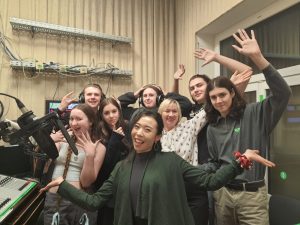
23 January 2024, 15:30-17:00
Open Forum with Mag. Dominik Stegmayer
Location: Kolingasse 14-16, 4 th floor 4.28, 1090 Vienna
Topic: Sudden entrepreneurs
29 January 2024, 15:30-17:00
Open Forum with Ass. Prof. Dr. Zsófia Lóránd
Location: Kolingasse 14-16, 4 th floor 4.28, 1090 Vienna
Topic: Women under the banner of friendship
Please let us know, if you’re interested in joining the event or if you have any further questions: Carine Chen, c.chen@eurozine.com
–
PREVIOUS EVENTS
18 December 2023, 15:30-17:00
Open Forum with Dr. Agata Zysiak
Location: Kolingasse 14-16, 4 th floor 4.28, 1090 Vienna
Topic: Bleaching blue collars
29 November 2023, 15:30-17:00
Open Forum with Olena Yermakova, M.A.
Location: Kolingasse 14-16, 4 th floor 4.28, 1090 Vienna
Topic: The way home
30 November 2023, 15:30-17:00
Open Forum with Mag. Martin Gumiela
Location: Kolingasse 14-16, 4 th floor 4.28, 1090 Vienna
Topic: Jeans, Chocolate and Personal Computers: The Polonia firms in late
state-socialist Poland
7 November 2023, 15:30-17:00
Open Forum with Lukas Becht, M.A.
Location: Bikes and Rails (Gemein und Gut), Emilie-Flöge-Weg 4, 1100
Vienna
Topic: Children of the twenty-first century
Read more about the event here.
Please let us know, if you’re interested in joining the event or if you have
any further questions: Carine Chen, c.chen@eurozine.com
16 May 2023, 12:30-14:00
Open Forum with Dr. des. Fabian Baumann
Location: Oskar-Morgenstern-Platz 1, Seminarraum 3, 1090 Vienna (Uni Vienna)
Topic: Choosing Ukraine, then and now.
Read more about the event here.
28 March 2023, 12:00-16:00
Twelve Ukrainian students (aged 16) of the Education Hub FREE PEOPLE met at Bikes and rails (workshop room provided by voluntary association Gemein und Gut) to kickstart the youth project together with Eurozine team members. The workshop, designed in the format of a focus group, was facilitated by RECET managing director Irena Remestwenski.
–
18 April 2023, 12:30-14:00
Open Forum with Dr. Mischa Gabowitsch
Location: Bikes and Rails (Gemein und Gut), Emilie-Flöge-Weg 4, 1100 Vienna
Topic: Monuments in times of war
Read more about the event here.
Please let us know, if you have any further questions: Anna Klein, office@eurozine.com
–
2 May 2023, 12:30-14:00
Open Forum with Dr. Rosamund Johnston
Location: Bikes and Rails (Gemein und Gut), Emilie-Flöge-Weg 4, 1100 Vienna
Topic: The lives and afterlives of Cold War weapons
Read more about the event here.
Please let us know, if you have any further questions: Anna Klein, office@eurozine.com
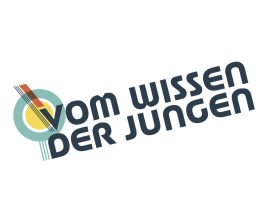
In collaboration with
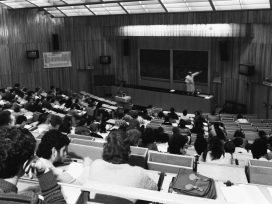
Expectations, standards, and requirements in higher education vary from country to country. In the third episode of the Knowledgeable Youth podcast Ukrainian students embark on the complex subject of tertiary education.
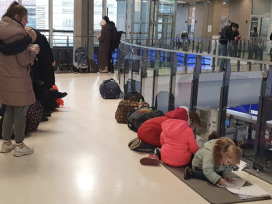
'It’s important to be open'
A Knowledgeable Youth podcast
Remaining in a new country or returning home? The Knowledgeable Youth podcast delves into the complex decision-making refugees face when migrating, together with researcher Olena Yermakova.
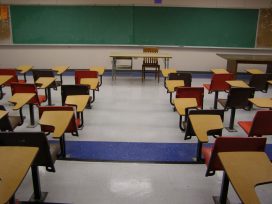
‘I feel freedom when I am in my school’
A Knowledgeable Youth podcast
When war entered the lives of Ukrainian schoolchildren, their teenage years were put on hold. In the first episode of the Knowledgeable Youth podcast, Ukrainian teens talk about finding their way in a new school system.
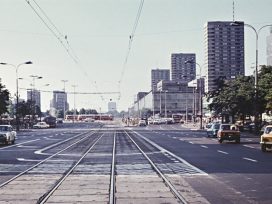
Private enterprises founded by diaspora Poles with seed capital from the West produced a range of consumer goods for the domestic market in the late Polish People’s Republic, blowing a ‘wind of change’ into the planned economy over a decade before the transformation.
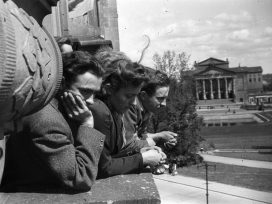
Socialist reform and modernization in post-WWII Poland opened the higher-education gate to underprivileged students. But early streaming to vocational school and societal expectations remained as barriers. What became of the working-class freshers who made it to the lofty heights of academia?
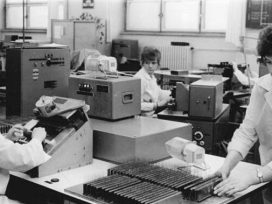
Economic and political transformation post-1989 exposed state-planned technological production in the former GDR to global markets. Uncompetitive operations soon led to closures and mass unemployment. But some workers, taking the crisis into their own hands, regrouped to found innovative tech companies.
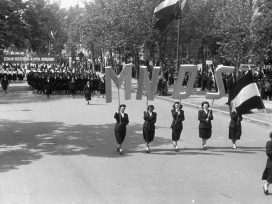
The euphoria of anti-fascists from WWII-occupied countries, meeting at international events, was a short-lived reprieve from oppression. Hungarian socialist groups, bringing women from all social classes together, went from publishing starstruck articles to testifying in Stalinist show trials, their solidarity forced into betrayal.
When a neighbourhood collapses into a warzone, from one day to the next, citizens become refugees. Securing safety and caring for those who remain creates a dual burden. Ukrainians, turning to their diaspora, have experienced both support and tension. Returning or remaining has become a political and deeply personal dilemma.
Youth, culturally associated with the future, seems increasingly afflicted by uncertainty and crises. Can looking ahead be informed by past moments of transition? In 1960s Poland young people’s ‘futurological’ outlooks uncovered the microsocial ambivalences of technological progress, revealing cracks in mass communist ideology.
Writing is a known tool for healing trauma. And poetry lends itself to rapid responses under pressure. Forced into migrating to flee war, many Ukrainian women turn to the short form as a call of solidarity, a weapon and solace.
Reintegrating Russian-speaking Ukrainians into the ‘Motherland’ – one of Putin’s central pretexts for war – has impacted a sharp counter reaction: many are abandoning their mother tongue, reaffirming their Ukrainian identity. Could Ukraine be headed for monolingualism after centuries of multi-language cultural exchange?
Since February 2022, Ukraine’s monumentscape has become contested symbolic ground: Russian aggressors alter, destroy or steal in demonstration of self-declared cultural superiority; Ukrainian iconoclasm is also on the rise. But might multiple local cultural meanings be lost in the process?
In socialist Czechoslovakia, one of the world’s biggest arms exporters, issues of durability and demise were taken into account. Why, then, do Cold War weapons continue to resurface in deadly attacks and armed conflicts across the globe, well beyond their alleged obsolescence?
Russia’s full-scale invasion of Ukraine has revived fears of looming nuclear apocalypse. Amidst weakened institutional frameworks and the great powers’ will to preserve the status quo, the non-proliferation doctrine is under increasing pressure.








